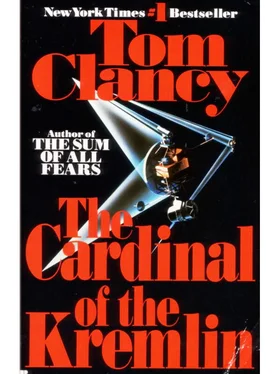Tom Clancy - The Cardinal of the Kremlin
Здесь есть возможность читать онлайн «Tom Clancy - The Cardinal of the Kremlin» весь текст электронной книги совершенно бесплатно (целиком полную версию без сокращений). В некоторых случаях можно слушать аудио, скачать через торрент в формате fb2 и присутствует краткое содержание. Год выпуска: 1988, Жанр: Триллер, на английском языке. Описание произведения, (предисловие) а так же отзывы посетителей доступны на портале библиотеки ЛибКат.
- Название:The Cardinal of the Kremlin
- Автор:
- Жанр:
- Год:1988
- ISBN:нет данных
- Рейтинг книги:3 / 5. Голосов: 1
-
Избранное:Добавить в избранное
- Отзывы:
-
Ваша оценка:
- 60
- 1
- 2
- 3
- 4
- 5
The Cardinal of the Kremlin: краткое содержание, описание и аннотация
Предлагаем к чтению аннотацию, описание, краткое содержание или предисловие (зависит от того, что написал сам автор книги «The Cardinal of the Kremlin»). Если вы не нашли необходимую информацию о книге — напишите в комментариях, мы постараемся отыскать её.
The Cardinal of the Kremlin — читать онлайн бесплатно полную книгу (весь текст) целиком
Ниже представлен текст книги, разбитый по страницам. Система сохранения места последней прочитанной страницы, позволяет с удобством читать онлайн бесплатно книгу «The Cardinal of the Kremlin», без необходимости каждый раз заново искать на чём Вы остановились. Поставьте закладку, и сможете в любой момент перейти на страницу, на которой закончили чтение.
Интервал:
Закладка:
"So, it looks like they made a breakthrough on laser power output," Ritter said.
" 'Throughput' is the current term," Greer corrected. "At least that's what Jack tells me. This is not very good news, gentlemen."
"Your usual keen eye for detail, James," Ritter said. "God, what if they get there first?"
"It's not the end of the world. Remember that it'll take ten years to deploy the system even after the concept is validated, and they haven't come close to doing that yet," the DCI pointed out. "The sky is not falling. This could even work to our benefit, couldn't it, James?"
"If Misha can get us a usable description of their breakthrough, yes. In most areas we're further along than they are," the DDI replied. "Ryan will need this for his report."
"He's not cleared for this!" Ritter objected.
"He had a look at Delta information before," Greer noted.
"Once. Only once, and there was a good reason for it – and, yes, he did damned well for an amateur. James, there's nothing here he can use except that we have reason to suspect Ivan has made a power – throughput? – breakthrough, and that Gregory kid already suspects it. Tell Ryan we've confirmed the suspicion through other assets. Judge, you can tell the President yourself that something's up, but it'll have to wait a few weeks. It shouldn't go any farther than that for a while."
"Makes sense to me." The Judge nodded. Greer conceded the point without argument.
There was the temptation to voice the opinion that this was CARDINAL's most important mission, but that would have been too dramatic for any of the three senior executives, and besides, CARDINAL had provided CIA with a good deal of important data over the years. Judge Moore reread the report after the others had left. Foley had tagged onto the end that Ryan had literally bumped into CARDINAL after Mary Pat had given him the new assignment – and right in front of Marshal Yazov. Judge Moore shook his head. What a pair, the Foleys. And how remarkable that Ryan had, after a fashion, made contact with Colonel Filitov. Moore shook his head. It was a crazy world.
CHAPTER 4
Bright Stars and Fast Ships
Jack didn't bother asking which "asset" had confirmed Major Gregory's suspicions. Field operations were something that he struggled – successfully for the most part – to keep at arm's length. What mattered was that the information was graded as Class-1 for reliability – CIA's newly adopted grading system used numbers 1-5 instead of letters A-E, surely the result of six months' hard work by some deputy-assistant-to educated at Harvard Business School.
"What about specific technical information?"
"I'll let you know when it comes in," Greer replied.
"I got two weeks to deliver, boss," Ryan pointed out. Deadlines were never fun. This was especially true when the document being prepared was for the President's eyes.
"I do seem to recall reading that somewhere or other, Jack," the Admiral noted dryly. "The people at ACDA are calling me every day for the damned thing, too. I think what we'll do is have you run over to brief them in person."
Ryan winced. The whole point of his Special National Intelligence Estimate was to help set the stage for the next session of arms negotiations. The Arms Control and Disarmament Agency needed it also, of course, so that they'd know what to demand and how much they could safely concede. That was quite a bit of additional weight on his shoulders, but as Greer liked to tell him, Ryan did his best work under pressure. Jack wondered if maybe he should screw one up sometime, just to disprove that idea.
"When will I have to go over?"
"I haven't decided yet."
"Can I have a couple of days' warning?"
"We'll see."
Major Gregory was actually at home. This was fairly unusual; even more so, he was taking the day off. But that wasn't his doing. His General had decided that all work and no play were beginning to take their toll on the young man. It hadn't occurred to him that Gregory could work at home as well.
"Don't you ever stop?" Candi asked.
"Well, what are we supposed to do in between?" He smiled up from the keyboard.
The housing development was called Mountain View. It wasn't a rousing bit of originality. In that part of the country the only way not to see mountains was to close your eyes. Gregory had his own personal computer – a very powerful Hewlett-Packard provided by the Project – and occasionally wrote some of his "code" there. He had to be careful about the security classification of his work, of course, though he often joked that he himself wasn't cleared for what he was doing. That was not an unknown situation inside government.
Dr. Candace Long was taller than her fiancé at nearly five-ten, willowy, with short, dark hair. Her teeth were a little crooked because she'd never wanted to suffer through braces, and her glasses were even thicker than Alan's.
She was thin because like many academics she was so enthralled with her work that she often forgot to eat. They'd first met at a seminar for doctoral candidates at Columbia University. She was an expert in optical physics, specifically in adaptive-optics mirrors, a field she'd selected to complement her life-long hobby, astronomy. Living in the New Mexico highlands, she was able to do her own observations on a $5,000 Meade telescope, and, on occasion, to use the instruments at the Project to probe the heavens – because, she pointed out, it was the only effective way to calibrate them. She had little real interest in Alan's obsession with ballistic-missile defense, but she was certain that the instruments they were developing had all kinds of "real" applications in her field of interest.
Neither of them was wearing very much at the moment. Both young people cheerfully characterized themselves as nerds, and as is often the case, they had awakened feelings in one another – feelings that their more attractive college fellows would have not thought possible.
"What are you doing?" she asked.
"It's the misses we had. I think the problem's in the mirror-control code."
"Oh?" It was her mirror. "You're sure it's software?"
"Yeah." Alan nodded. "I have the readouts from the Flying Cloud at the office. It was focusing just fine, but it was focusing on the wrong place."
"How long to find it?"
"Couple of weeks." He frowned at the screen, then shut it down. "The hell with it. If the General finds out that I'm doing this, he might never let me back in the door."
"I keep telling you." She wrapped her hands around the back of his neck. He leaned back, resting his head between her breasts. They were rather nice ones, he thought. For Alan Gregory it had been a remarkable discovery, how nice girls were. He'd dated occasionally in high school, but for the most part his life at West Point, then at Stony Brook, had been a monastic existence, devoted to studies and models and laboratories. When he'd met Candi, his initial interest had been in her ideas for configuring mirrors, but over coffee at the Student Union, he'd noticed in a rather clinical way that she was, well, attractive – in addition to being pretty swift with optical physics. The fact that the things they frequently discussed in bed could be understood by less than one percent of the country's population was irrelevant. They found it as interesting as the things that they did in bed – or almost so. There was a lot of experimentation to do there, too, and like good scientists, they'd purchased textbooks – that's how they thought of them – to explore all the possibilities. Like any new field of study, they found it exciting.
Gregory reached up to grasp Dr. Long's head, and pulled her face down to his.
"I don't feel like working anymore for a while."
Читать дальшеИнтервал:
Закладка:
Похожие книги на «The Cardinal of the Kremlin»
Представляем Вашему вниманию похожие книги на «The Cardinal of the Kremlin» списком для выбора. Мы отобрали схожую по названию и смыслу литературу в надежде предоставить читателям больше вариантов отыскать новые, интересные, ещё непрочитанные произведения.
Обсуждение, отзывы о книге «The Cardinal of the Kremlin» и просто собственные мнения читателей. Оставьте ваши комментарии, напишите, что Вы думаете о произведении, его смысле или главных героях. Укажите что конкретно понравилось, а что нет, и почему Вы так считаете.






![Александр Ирвин - Tom Clancy’s The Division 2. Фальшивый рассвет [litres]](/books/417744/aleksandr-irvin-tom-clancy-s-the-division-2-falsh-thumb.webp)





